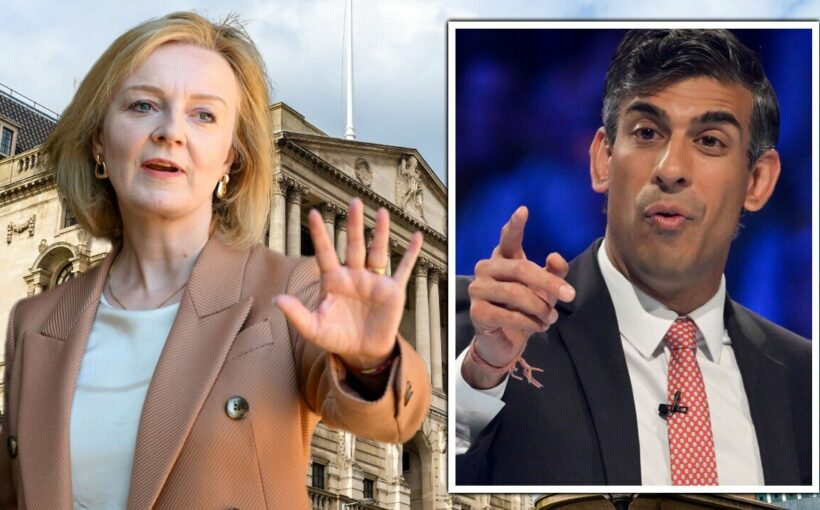Tory leadership: A look and Truss and Sunak’s policy’s
We use your sign-up to provide content in ways you’ve consented to and to improve our understanding of you. This may include adverts from us and 3rd parties based on our understanding. You can unsubscribe at any time. More info
She told the Daily Express she will harness Brexit freedoms to drive the country forward if she wins the race to become Prime Minister.
“I am the candidate with a clear plan for economic growth, and the person people can trust to push through the difficult reforms that are needed to get Britain’s economy firing on all cylinders,” she said.
Her bold plan comes with interest rates set for a record rise tomorrow (Thur) as the Bank of England seeks to tame inflation. Rates could be hiked by 0.5 per cent – the largest jump in 27 years – to 1.75 per cent as inflation continues to surge.
Ms Truss insists her fiscal plans, which include £30 billion tax cuts, will help kick-start the economy and avoid a deeply damaging recession.
The Foreign Secretary has pledged to “start cutting taxes from day one”, reverse April’s rise in national insurance and next year’s corporation tax hike from 19 per cent to 25 per cent. She says the benefits of Brexit also remain untapped.
“I will continue what Boris started on Brexit by ditching EU regulations holding back our economy, and bring in new low-tax investment zones across the country that will encourage businesses to put more money into our local areas and high streets,” she added.
And in a swipe at her leadership rival Rishi Sunak she adds: “We cannot tax our way to growth.”
The ex-Chancellor has pitched himself as the fiscally conservative candidate, only promising tax cuts that “drive growth”, and keeping the NI and Corporation hikes in place.
The fiscal battle has dominated the leadership election so far with Ms Truss having a clear lead over her rival in the battle for No.10. Thursday’s decision by BoE governor Andrew Bailey could have a massive impact on whether the UK economy tips into recession.
Inflation soared to 9.4 per cent in June, largely fuelled by rising energy costs caused by Russia’s invasion of Ukraine, slowing the economic bounceback from the pandemic.
But recent data suggests economic growth has held up better than expected in the second quarter of 2022 and employment has continued to grow strongly.
Ms Truss’ plans to boost the economy come as she was likened to Margargret Thatcher for having a “strong grip” on policy detail.
Allies also she has the “care and diligence” to deliver “credible” plans that will help the British public British, ensuring taxpayers money is properly invested in frontline services and not squandered.
The backing comes after the Tory leadership favourite scrapped a key election pledge to link public sector pay to local living costs. The Foreign Secretary had proposed regional pay boards, in a bid to save taxpayers a potential £8.8billion.
But the policy was criticised by several senior Tories, who argued it would mean lower pay for millions of workers outside London. Ms Truss has now said the proposal would not be taken forward.
“I never had any intention of changing the terms and conditions of teachers and nurses,” she said. “What I want to be clear about is that I will not be going ahead with the regional pay boards.”
Earlier a spokesperson for Ms Truss’s campaign said current levels of public sector pay would be maintained if she became PM. Writing in the Daily Express Tory MP Alberto Costa heaped praise on Ms Truss.
The longest serving MP on the Committee on Standards and Privileges, said: “Throughout her public service, she has shown attention to detail. This is an essential prerequisite to establish good governance. Margaret Thatcher understood this well.
“Only by mastering the minute details of a ministerial brief, as Liz has always done, can a politician uphold good governance and be trusted to deliver effective policies that help our country. She will hit the ground running in Number 10.”
Describing Ms Truss as an “effective leader” he adds: “Her detailed plans will immediately tackle the challenging cost of living crisis and reignite economic growth, whilst ensuring that taxpayers’ money is properly invested in frontline services and not squandered.”
Announcing the policy on Monday night, Ms Truss had said she wanted “a leaner, more efficient, more focused Whitehall” and set out plans which suggested savings of £11billion a year.
This included £8.8billion which would come from introducing regional pay boards, meaning that civil servant pay – and potentially later other public sector workers’ salaries – could be adjusted to reflect the area where civil servants work.
It could have seen workers in, for example, the south-west or north of England paid less than those in the south-east.
In addition to saving money, the Truss camp also argued it would help boost growth in areas, where the private sector had been crowded out by public sector salaries.
However, the proposal was dropped after just over 12 hours when it was met with strong resistance from Tories.
Tees Valley mayor Ben Houchen – who is supporting Mr Sunak – described the policy as “horrifically bad”, telling the BBC’s World at One it could lead to more scrutiny of policy from the foreign secretary.
Mr Sunak’s camp argued that the move was no mistake, saying that Ms Truss had called for the move when she was chief secretary to the Treasury in 2018.
“It demonstrates a lack of serious judgement by setting out plans that would see pay dramatically cut for police, nurses and our armed forces in Cardiff and Canterbury, Teesside and Taunton during a cost of living crisis,” they said.
“It also shows a worrying lack of grip of detail in what is already a woolly economic plan.
“If this was in a general election, it would have been a potentially fatal own goal for the Conservatives.”
Source: Read Full Article



